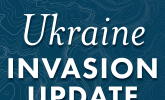Ukraine Invasion Update 24
April 22, 2022 - ISW Press
Russia and Ukraine are unlikely to resume negotiations in the coming weeks. Both sides await the outcome of Russia’s ongoing offensive in eastern Ukraine as they attempt to build leverage for future negotiations. Russian Foreign Minister Sergey Lavrov announced that the second phase of Russia’s invasion of Ukraine began on April 19 and that its objective is the “complete liberation” of the entirety of Donetsk and Luhansk oblasts, which are claimed by Russia’s proxies in eastern Ukraine. Ukrainian President Volodymyr Zelensky said on April 17 that he “[doesn’t] trust the Russian military and Russian leadership” to not attempt to take Kyiv again if they win the battle for eastern Ukraine and re-emphasized that Ukraine is unwilling to give up its territory to end the war.










